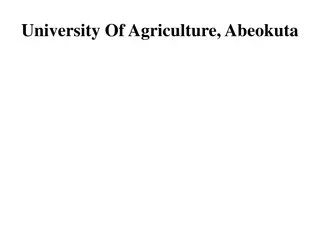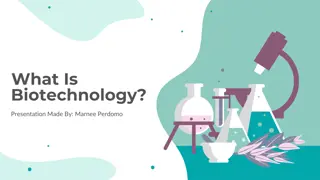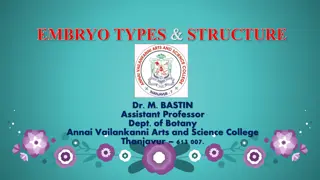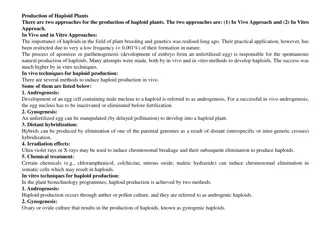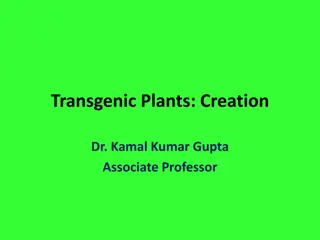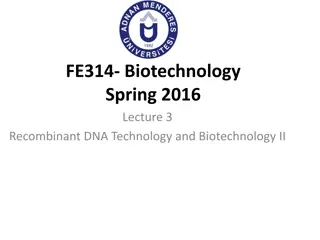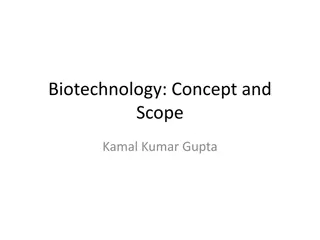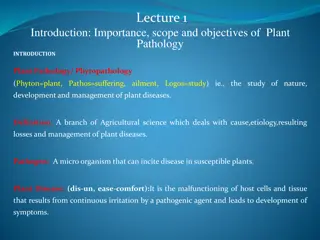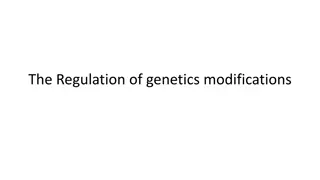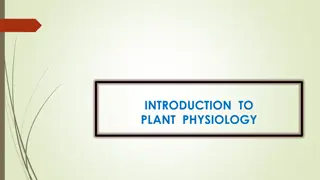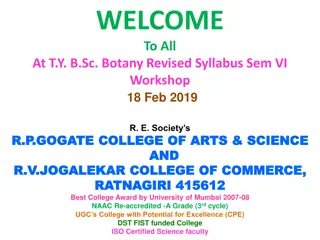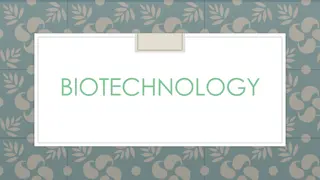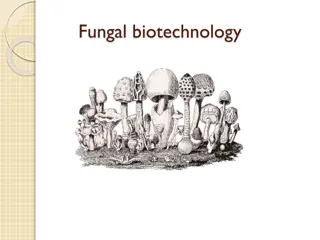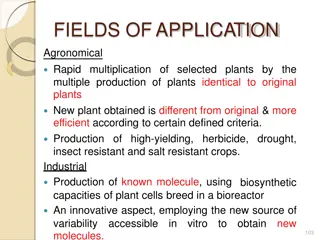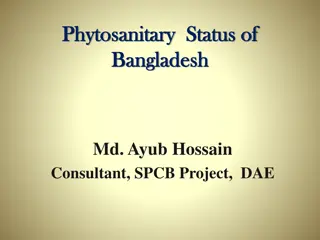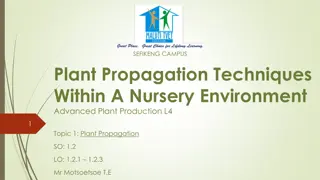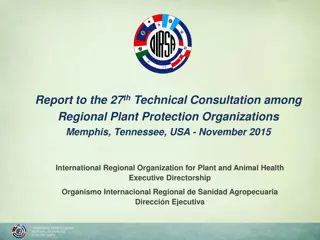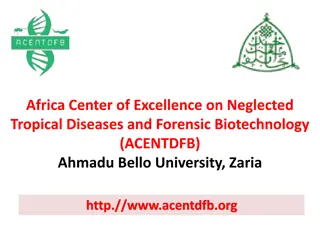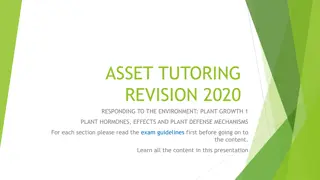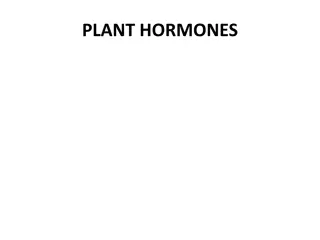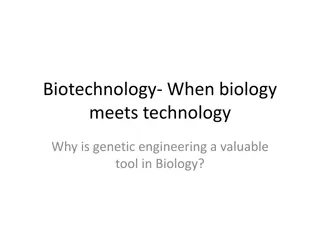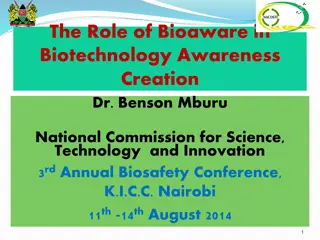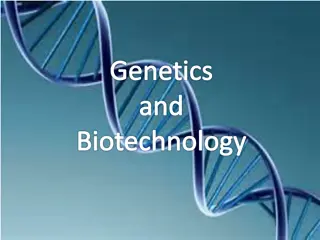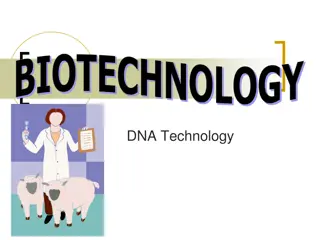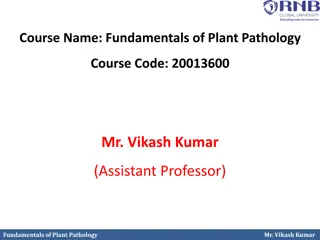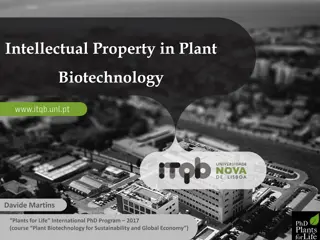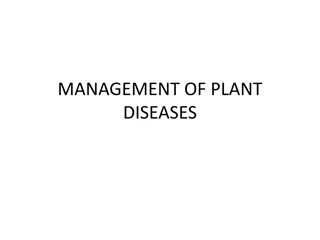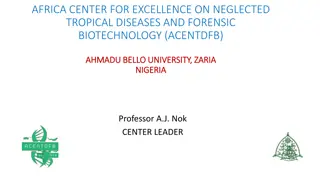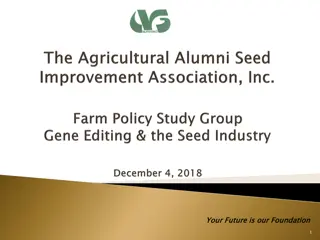Unit 1: Introduction and History of plant pathology
The science of plant pathology, which studies plant diseases and aims to protect the food supply by improving plant survival in unfavorable conditions. Explore the causes of plant diseases, their symptoms, and methods of prevention and control.
5 views • 13 slides
Amway Nutrilite All Plant Protein Powder 1kg Deutsche Post AG
Amway Nutrilite All Plant Protein Powder is a premium source of protein derived from plant-based ingredients. With each serving, you get a blend of high-quality protein to support your active lifestyle and dietary needs.\nAmway Nutrilite All Plant Protein Powder offers a convenient way to supplement
1 views • 4 slides
Introduction to Biotechnology in Pharmaceutical Sciences: A Comprehensive Overview by Swarnakshi Upadhyay
Biotechnology in pharmaceutical sciences encompasses the application of scientific and engineering principles to utilize biological agents for various services. It includes molecular biology for production of pharmaceuticals like antibiotics, proteins, and enzymes, as well as large-scale production
0 views • 9 slides
Exploring Biotechnology in Agriculture at University of Abeokuta
Delve into the world of Biotechnology at the University of Agriculture in Abeokuta, where students are equipped with interdisciplinary knowledge to apply microorganisms for practical applications in society. The course, led by Prof. I. Akpan and Dr. F. Oluwafemi, aims to broaden students' understand
0 views • 61 slides
Understanding Biotechnology: A Comprehensive Overview
Biotechnology is the application of technology based on biology, utilizing living organisms and molecular biology to create healthcare products. It involves studying the functionality of living organisms by combining biology, physics, chemistry, mathematics, and technology. Careers in biotechnology
0 views • 8 slides
Ongoing USDA Programs and Biotechnology Research Overview
This overview delves into ongoing USDA programs such as the Biotechnology Risk Assessment Grants (BRAG) Program, which supports biotechnology research. The program covers risk assessment, management, pollen flow research, gene transfer control methods, and more. Additionally, voluntary market facili
0 views • 16 slides
Understanding Plant Embryogenesis: A Comprehensive Overview
Plant embryogenesis is a crucial process in the development of plant embryos from fertilized ovules, involving cell division, differentiation, and morphogenesis. This process leads to the formation of seeds, which play a vital role in the plant life cycle. The stages of embryo formation, structure,
0 views • 25 slides
Understanding Plant Tissue Culture: Methods and Requirements
Plant tissue culture involves the in-vitro culture of plant explants under aseptic conditions, covering cell, organ, and suspension cultures. This process, pioneered by German botanist Gottlieb Haberlandt, relies on the totipotency of plant cells. Key requirements include laboratory organization, su
0 views • 18 slides
Production of Haploid Plants: Approaches and Significance
There are two main approaches for haploid plant production - in vivo and in vitro methods. Haploids are important in plant breeding but are rare naturally. Various techniques like androgenesis, gynogenesis, distant hybridization, irradiation, and chemical treatments are used to induce haploid produc
0 views • 4 slides
Understanding Plant Tissue Culture Media and Their Importance in In Vitro Growth
Plant tissue culture media play a crucial role in the in vitro growth and morphogenesis of plant tissues. The composition of culture media depends on the specific plant species and the type of material used for culture. Various types of media, such as White's medium, MS medium, B5 medium, N6 medium,
0 views • 6 slides
Understanding Transgenic Plants and Agrobacterium Tumefaciens in Plant Biotechnology
Creation of transgenic plants involves various methods such as microprojectile DNA-coating, electroporation, and Agrobacterium transformation. Agrobacterium tumefaciens, a soil bacterium, plays a crucial role in inducing crown gall disease in plants by transferring T-DNA from the Ti plasmid. The Ti
0 views • 27 slides
Applications of Recombinant DNA Technology in Biotechnology
Explore the various applications of recombinant DNA technology in biotechnology, including insulin production for diabetes, enzyme production in food biotechnology, and the development of Golden Rice. Understand the process of insulin production using recombinant DNA technology and the significance
0 views • 32 slides
Insights into Biotechnology: Concepts and Applications
Biotechnology involves the application of scientific and engineering principles to utilize biological agents for producing goods and services. The field encompasses processes like upstream processing, fermentation, and downstream processing to create valuable compounds. Initially, efforts focused on
0 views • 22 slides
Understanding Plant Pathology: Importance, Scope, and Objectives
Plant pathology, also known as phytopathology, is the study of plant diseases and their management. It covers the causes, symptoms, and impact of pathogenic organisms on plants. The field aims to understand the interactions between plants and pathogens, develop control methods, and reduce losses in
0 views • 6 slides
The Regulation of Genetics Modifications in Biotechnology
Biotechnology plays a significant role in engineering plants and regulating food crops through genetic modifications. The use of modern biotechnology, such as genetically modified organisms (GMOs), has grown exponentially worldwide. Advantages include increased agricultural productivity and improved
0 views • 11 slides
Introduction to Plant Physiology: Exploring the Functioning of Plants
Plant physiology is a crucial subdiscipline of botany that delves into the processes and functions operating within plants. This field closely examines areas like plant morphology, ecology, cell biology, and genetics, shedding light on vital processes such as photosynthesis, respiration, and more. T
1 views • 7 slides
Workshop on T.Y.B.Sc. Botany Revised Syllabus Semester VI at R.P. Gogate College of Arts & Science and R.V. Jogalekar College of Commerce
This workshop, held on 18th Feb 2019, introduced the revised syllabus for Semester VI of the T.Y.B.Sc. Botany program at R.P. Gogate College of Arts & Science and R.V. Jogalekar College of Commerce in Ratnagiri. The syllabus covers topics such as plant diversity, form and function, current trends in
0 views • 26 slides
Biotechnology Technician Certificate Program Overview
The Biotechnology Technician certificate program offers an insight into the science and technical skills required for a career in biotechnology. Graduates gain essential laboratory skills, scientific knowledge, and critical thinking abilities to work effectively in the industry. The curriculum cover
1 views • 9 slides
Understanding Plant Tissue Culture: Techniques and Applications
Plant tissue culture involves maintaining and growing plant cells, tissues, or organs in artificial mediums under controlled conditions. It allows the regeneration of whole plants from small plant parts or cells. Hormones like auxins, cytokinins, and gibberellins are used in the process. Proper envi
3 views • 5 slides
Advances in Biotechnology: Transforming Health, Environment, and Science
The 21st century is witnessing remarkable progress in biotechnology, with significant discoveries shaping the fields of health, environment, and science. From the introduction of penicillin antibiotics to the creation of transgenic organisms, biotechnology continues to pave the way for innovative so
0 views • 17 slides
Understanding Biotechnology: Techniques, Definitions, and Applications
Biotechnology involves the use of living organisms or their components to develop products in various fields like Industry, Agriculture, Medicine, and Food Processing. It integrates biochemistry, microbiology, and engineering sciences for industrial applications, including genetic engineering to cre
2 views • 27 slides
Exploring the World of Fungal Biotechnology
Fungal biotechnology involves utilizing living organisms like fungi for industrial applications, leading to the production of various valuable products such as enzymes, vitamins, and secondary metabolites. This field not only benefits industries by offering energy-efficient processes but also contri
0 views • 15 slides
Plant Tissue Culture Methods for Growth and Reproduction Study
Plant tissue culture methods such as root tip culture, shoot-tip culture, leaf culture, flower culture, and anther and pollen culture allow for the study of growth, reproduction, and genetic variations in plants. These techniques involve culturing various plant parts under sterile conditions to inve
1 views • 20 slides
Plant Tissue Culture Applications in Agriculture and Biotechnology
Plant tissue culture technology is a versatile tool used in agronomy and biotechnology for rapid multiplication of selected plants, production of high-yielding, herbicide, drought, insect, and salt-resistant crops, as well as the generation of phytopharmaceuticals, secondary metabolites, and novel c
0 views • 17 slides
Understanding Plant Quarantine and Phytosanitary Measures
Plant quarantine involves efforts to prevent the entry, establishment, or spread of foreign pests through legal restrictions on plant and plant product movement. It is crucial for safeguarding plant health, food production, and ecosystems. Phytosanitary measures aim to ensure the health of plants by
0 views • 33 slides
Understanding Mineral Nutrition in Plants
Mineral nutrition in plants involves the acquisition of essential elements in the form of inorganic ions from soil, followed by their absorption and utilization in various plant processes. Around 60 different elements have been reported in plants, with 30 being essential for plant growth. These esse
0 views • 39 slides
Plant Propagation Techniques in Nursery Environment
Learn about plant propagation techniques within a nursery environment, including nursery operations, potting seedlings, plant protection, weed control, packing of nursery plants, and crafting tissues for plant growth. Explore the essential tasks involved in nurturing seedlings and trees before they
0 views • 17 slides
Plant Health Initiatives at the 27th Technical Consultation Among Regional Plant Protection Organizations - Memphis, Tennessee
The 27th Technical Consultation in Memphis, Tennessee focused on plant health initiatives by the International Regional Organization for Plant and Animal Health. OIRSA emphasized four key technical areas: plant health, animal health, agricultural quarantine, and food safety. Projects included addres
0 views • 13 slides
Advancing Research and Innovation in Neglected Tropical Diseases and Forensic Biotechnology at Ahmadu Bello University, Zaria
The Africa Center of Excellence on Neglected Tropical Diseases and Forensic Biotechnology (ACENTDFB) at Ahmadu Bello University in Zaria is focused on upgrading its facilities, expanding research units, and establishing advanced laboratories to address global health challenges. Strategic objectives
0 views • 11 slides
Plant Growth Hormones and Defense Mechanisms: Understanding Plant Responses to the Environment
Plant growth hormones and defense mechanisms play crucial roles in how plants respond to environmental stimuli such as water, sunlight, gravity, and more. From auxins promoting cell growth to gibberellins stimulating flowering, this presentation educates on the intricacies of plant hormones and thei
1 views • 13 slides
Understanding Plant Hormones and Their Role in Growth and Development
Plant hormones are vital compounds that regulate various processes in plant growth and development. They are mostly organic and can be gases. These hormones are produced in one part of the plant and transported to other parts where they induce physiological effects. The main phytohormones include Au
0 views • 125 slides
Exploring Genetic Engineering and DNA Fingerprinting in Biotechnology
Discover the intersection of biology and technology through genetic engineering and biotechnology, which have revolutionized fields such as forensics, medicine, and agriculture. Learn about DNA manipulation, DNA fingerprinting processes, and how they are applied in forensic investigations and patern
0 views • 27 slides
Role of Bioaware in Biotechnology Awareness Creation
Bioaware, the national biotechnology awareness strategy hosted at NACOSTI, aims to provide a participatory mechanism for creating awareness about the role of biotechnology in Kenya's development agenda. It seeks to impart knowledge of biotechnology and its products to human health and the environmen
0 views • 16 slides
Exploring Genetics and Biotechnology Concepts
This educational content delves into various genetics and biotechnology concepts, including genotypes, DNA segments, heredity, flower color inheritance, genetic crosses, and biotechnology processes. It clarifies terms like homozygous, heterozygous, dominant alleles, DNA components, and parental trai
0 views • 31 slides
Understanding Biotechnology: From Ancient Techniques to Modern Genetic Engineering
Biotechnology is the study of utilizing tools from living organisms to develop new products and processes for the benefit of society. It encompasses ancient practices like fermentation to modern genetic engineering techniques, such as manipulating genetic information in organisms. The Human Genome P
0 views • 31 slides
Exploring the Fundamentals of Plant Pathology: Understanding Viruses in Plant Diseases
Delve into the world of plant pathology with Mr. Vikash Kumar, as you learn about the nature, structure, and transmission of viruses affecting plants. Explore the important characteristics of plant viruses, their unique properties, and how they interact within plant cells. Gain insights into viral d
0 views • 14 slides
Intellectual Property in Plant Biotechnology: Importance, Protection, and Implications
Understanding the significance of intellectual property in plant biotechnology is vital for innovation and development. It involves protecting creations of the mind like inventions, designs, and symbols to incentivize research and reward inventors. Milestones in intellectual property protection, mea
0 views • 11 slides
Overview of Plant Quarantine and Disease Management
Plant quarantine is a crucial practice that involves regulating the movement of plants and plant products to prevent the spread of pests and diseases. Originating with the first law in France in 1860, plant quarantine now encompasses various methods such as embargoes and inspections to safeguard pla
0 views • 11 slides
Africa Center for Excellence on Neglected Tropical Diseases and Forensic Biotechnology (ACENTDFB), Ahmadu Bello University, Zaria, Nigeria
ACENTDFB, established in 2014 at Ahmadu Bello University, Zaria, focuses on neglected tropical diseases like trypanosomiasis, onchocerciasis/filiariasis, rabies, and forensic biotechnology. The center offers postgraduate programs, including PhD and MSc in Biotechnology, and short courses on various
0 views • 24 slides
Evolution of Biotechnology in Agriculture: Challenges and Controversies
Explore the evolution of biotechnology in agriculture through traditional plant breeding to modern genetic transformation technologies. Witness the promise of novel traits and faster breeding cycles, alongside the instant controversy and regulatory challenges faced by the industry. Discover the shif
0 views • 24 slides



